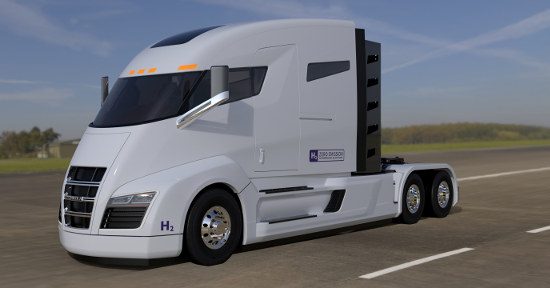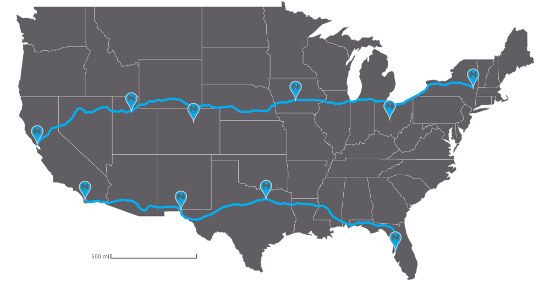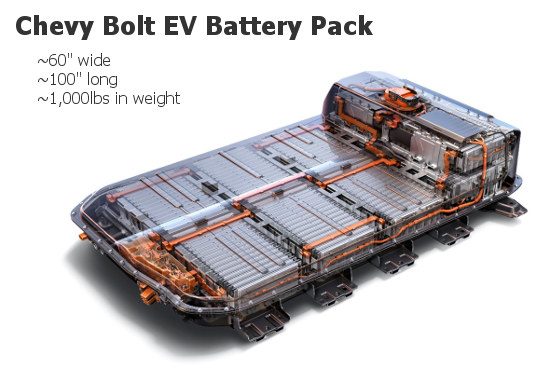Nikola One – Hydrogen Powered Big Rig Offers Glimpse Into The Future
Jason Lancaster | Aug 30, 2016 | Comments 1
A new hydrogen powered class 8 truck (aka big rig) from Nikola Motor Company offers a glimpse into the future of all trucks. With excellent power and range, the Nikola One shows how automakers could use hydrogen to power pickup trucks and large SUVs.

The Nikola One is powered by a hydrogen fuel cell. The drivetrain has more power than anything on the road, 1200 miles of range, and gets up to 20mpg.
About The Nikola One
The Nikola One has a long list of features:
- The truck is powered by a 300kW fuel cell stack paired with a 320kwh battery pack and a 100kg hydrogen storage system. This combination has a range of 1200 miles.
- The truck’s powertrain puts out 2,000lb-ft of torque and over 1,000 hp, making it more powerful than any production class 8 truck on the road.
- The truck uses regenerative brakes, which offer improved brake performance over standard brakes. Nikola says the truck stops twice as well as a typical diesel class 8.
- The truck will be 100% emissions free. The hydrogen used to power the fuel cell will come from Nikola’s own “farm” of solar powered electrolysis machines.
- By 2020, Nikola plans to have a national network of 50 hydrogen stations for Nikola owners. This will ensure coverage on most major trucking routes.
- According to the company, the cost of operating a Nikola One is roughly one-half the cost of operating a diesel powered class 8 truck.
Breathless praise aside, here’s the most important feature of all: Nikola has $3 billion in pre-orders. This truck is real, it has real buyers, and you’re going to see them on the roadway in the next five years.
Why Pickup Owners Should Pay Attention To This Truck
If you’re a loyal reader of TundraHeadquarters, you know that we don’t usually talk about big rigs on this site. We’re making an exception because the Nikola’s powertrain could be a model for future pickup trucks.
- Trucks powered only by battery packs will have too short a range. According to Nikola, the 320kWh battery pack can only power the truck for 100-200 miles. That’s fine for a local delivery truck, but not enough for an over-the-road hauler. The combination of a battery pack and a fuel cell is the key to ensuring range. A battery pack would need to be larger than 2000kWh to offer comparable range to the battery pack + fuel cell stack combo.
Could Nikola load a massive 2,000kWh battery pack into the truck and eliminate the fuel cell? Sure. But the cost of doing so would be high, not to mention the increased weight and cargo limitations a large battery pack would create. Charging time would also be an issue.
- Trucks powered only by fuel cell stacks and small batteries will have limited power. Toyota’s Mirai – which uses a 110kw fuel cell stack alongside a small hybrid battery pack – can’t produce much power. The Mirai’s acceleration is roughly the same as a Toyota Prius, which is to say it’s slow as hell. By using a larger battery pack, Nikola’s One can produce outrageous amounts of torque.
- You don’t need a huge network of hydrogen filling stations to satisfy consumers. Take a look at Nikola’s planned fuel cell station map below:

Nikola’s planned network of hydrogen fuel stations.
That’s projected to be sufficient for typical trucking routes:

Nikola trucking route examples
A lot of critics sa that fuel cell powered vehicles are only viable if there’s a national network of hydrogen filling stations. However, if the vehicle has enough range, a handful of stations are all it takes to get hydrogen technology off the ground.
- Hydrogen power is cheap to own and operate. According to the company, the operating costs of a Nikola One are half those of a typical class 8 diesel truck. This is because hydrogen isn’t much more expensive than diesel (about 30% more), but nearly twice as efficient. When you add in the fact that hydrogen fuel cells don’t need oil changes, air filters, spark plugs, etc., the cost savings are tremendous.
- Hydrogen fill-ups are quick. The Nikola One has a refuel time of 15mins. That’s not bad considering the vehicle holds 100kg of hydrogen. If you replace the fuel cell stack with a battery pack, 15 mins would likely turn into several hours.
But Batteries Are Better Than Fuel Cells! Right?
A lot of critics argue that fuel cells are worse than batteries because:
- They’re more expensive
- They’re not as energy efficient
- There aren’t enough hydrogen refueling stations
- Elon musk says so!
With respect to Elon Musk, Nikola’s use of fuel cells is challenging conventional wisdom.
Fuel cells are expensive, to be sure, but battery packs are also expensive. GM announced that they can produce a battery pack for $145/kWh, which means that a 2,000kWh battery would cost nearly $300k. The Nikola One has an asking price of roughly $400k, which means that the cost of a fuel cell is at least comparable to the cost of a battery pack (if not lower).

The Chevy Bolt’s battery pack is 1,000lbs, about 5 feet wide and 9 feet long, and it’s only rated at 60kWh. Imagine how big a 2,000kWh battery pack would be. Not to mention how much it might cost.
It’s true that creating hydrogen via electrolysis isn’t as energy efficient as using electricity to charge a battery…but this really doesn’t matter. All that matters is the operating cost of the vehicle, and the Nikola One is half as expensive to operate as a typical diesel truck. Maybe someone will come along and build a battery powered class 8 truck with 1,000+ miles of range, and when they do we can have the efficiency discussion. But right now, the point is irrelevant.
It’s also true that there aren’t many hydrogen fuel stations, but there will be. Nikola has $3 billion worth of vehicles on order. They have funds to build hydrogen stations along key trucking routes, and they’re guaranteeing their customers access to these stations by building 5-10 pumps at each station. If a startup can build enough hydrogen stations to serve demand, a consortium of automakers can do the same.
Will We See A Toyota Tundra With A Fuel Cell?
While it’s purely speculation on my part, I think the odds of a fuel cell powered Tundra are higher than ever. Nikola’s truck is going to go a long ways towards convincing truck owners that a fuel cell is rugged and capable.
Not to mention, Toyota has made a substantial commitment to fuel cell technology, and it’s clear that fuel cell prices are falling:
- Nikola had plans to use a gas turbine to charge the battery pack, but they replaced the turbine with a fuel cell
- Hyundai has announced a 50% price drop in their next generation hydrogen fuel cell vehicle
- Toyota has previously committed to building fuel cell powered vehicles for roughly the same price as gas-electric hybrids by 2025
While there are still some uncertainties, the odds of a fuel cell powered Tundra sometime in the next decade seem better than 50/50.
Search terms people used to find this page:
- tundraheadquarters
Filed Under: Auto News


Isn’t the cheapest way to produce large volumes of hydrogen come from natural gas? Virtually an unlimited and the most economical supply?